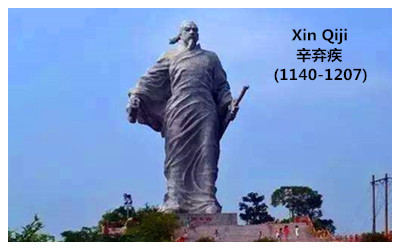
Xin Qiji 辛弃疾
 Xin Qiji (辛弃疾1140-1207), was from Licheng County, Shandong East Road, Jinan Prefecture (now in Sifengzha Village, Yaoqiang Town, Licheng District, Jinan City). At the age of 21, he joined the Anti-Jin Army. He was not only an official and general but also a famous bold poet in the Southern Song Dynasty.
Xin Qiji (辛弃疾1140-1207), was from Licheng County, Shandong East Road, Jinan Prefecture (now in Sifengzha Village, Yaoqiang Town, Licheng District, Jinan City). At the age of 21, he joined the Anti-Jin Army. He was not only an official and general but also a famous bold poet in the Southern Song Dynasty.
Xin Qiji wrote more than 600 lyrics, which werecollected in jiaxuan's Lyrics . Strong patriotism and fighting spirit are the basic essence of Xin Qiji's lyrics. In Partridge Sky and Dance of theCavalry, he reiterates his yearning for the North and his memories of the war against the Kin in North China. In Congratulations to theBridegroom (Cheng Tongpu come over for the new year from Dongyang)and Groping for Fish, he compares the collapsing Southern Song Dynastyto the "remains of mountains" and a "setting sun" in order to expresshis distaste at the imperial court's submission in the face of invasion.Unable to fulfill his ambitions, Xin had to express his umbrage throughhis works.
Xin Qiji was good at writing lyrics reflecting on past events.For example, in Water Dragon Chant (on Riverside Tower at Jiankang)and Water Dragon Chant(Passing by Shuangxi Tower at Nanjian), beforea breath-taking landscape he remembers past heroes, and his high idealsare greatly inspired, yet all he can do is sigh over the confining of hisabilities. The intense confrontation between his ideas and reality imbuethe lyrics with a simple and stirring heroism.
Xin Qiji further broadened the scope of the subject matter found inSu Shi's lyrics. There was almost nothing that could not be written aboutin his works. Artistically, Xin Qijis lyrics are characterized by vivid andhyperbolic description and imagination, the essence of the "powerfuland free" school. Because Xin had actual battle experience, he couldevoke grand battle scenes in his lyrics with animated language.
Xin Qijioften used the technique of bi (metaphor) and Xing (elaboration) to helpin expressing his feelings. For example, in Groping for Fish (How muchmore can spring bear of wind and rain), by describing the love of springand begrudging its transience, the poet reveals his ambivalence towardsthe imperial court.







 Ask Questions ?
Ask Questions ?